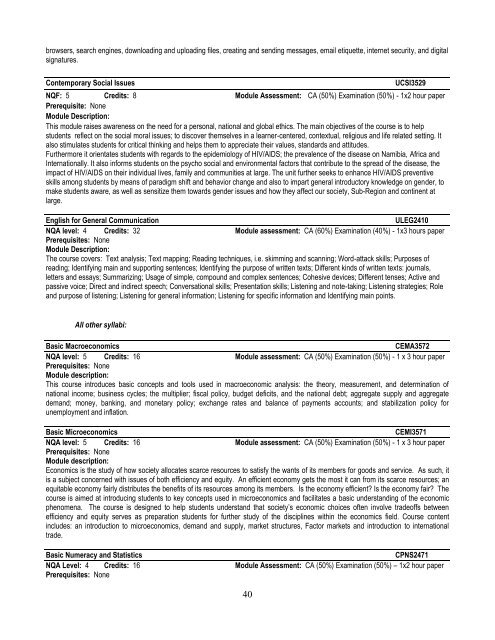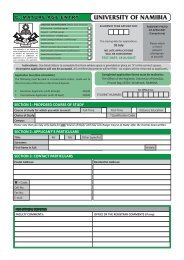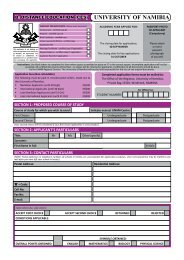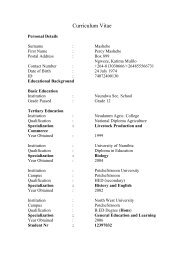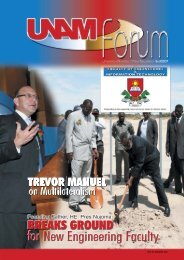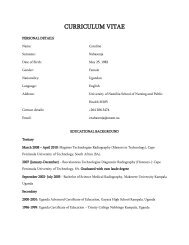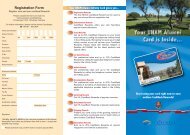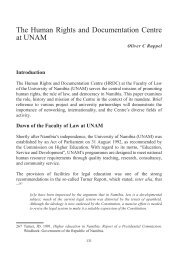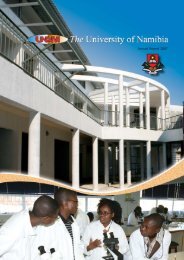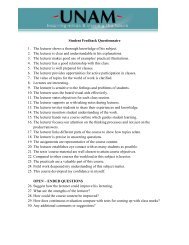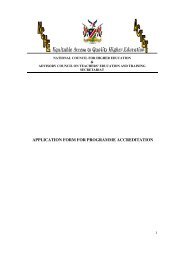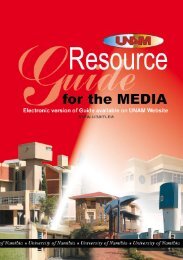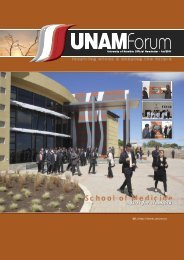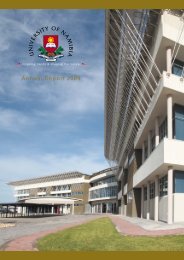UNIVERSITY OF NAMIBIA CENTRE FOR EXTERNAL STUDIES ...
UNIVERSITY OF NAMIBIA CENTRE FOR EXTERNAL STUDIES ...
UNIVERSITY OF NAMIBIA CENTRE FOR EXTERNAL STUDIES ...
Create successful ePaper yourself
Turn your PDF publications into a flip-book with our unique Google optimized e-Paper software.
owsers, search engines, downloading and uploading files, creating and sending messages, email etiquette, internet security, and digitalsignatures.Contemporary Social IssuesUCSI3529NQF: 5 Credits: 8 Module Assessment: CA (50%) Examination (50%) - 1x2 hour paperPrerequisite: NoneModule Description:This module raises awareness on the need for a personal, national and global ethics. The main objectives of the course is to helpstudents reflect on the social moral issues; to discover themselves in a learner-centered, contextual, religious and life related setting. Italso stimulates students for critical thinking and helps them to appreciate their values, standards and attitudes.Furthermore it orientates students with regards to the epidemiology of HIV/AIDS; the prevalence of the disease on Namibia, Africa andInternationally. It also informs students on the psycho social and environmental factors that contribute to the spread of the disease, theimpact of HIV/AIDS on their individual lives, family and communities at large. The unit further seeks to enhance HIV/AIDS preventiveskills among students by means of paradigm shift and behavior change and also to impart general introductory knowledge on gender, tomake students aware, as well as sensitize them towards gender issues and how they affect our society, Sub-Region and continent atlarge.English for General CommunicationULEG2410NQA level: 4 Credits: 32 Module assessment: CA (60%) Examination (40%) - 1x3 hours paperPrerequisites: NoneModule Description:The course covers: Text analysis; Text mapping; Reading techniques, i.e. skimming and scanning; Word-attack skills; Purposes ofreading; Identifying main and supporting sentences; Identifying the purpose of written texts; Different kinds of written texts: journals,letters and essays; Summarizing; Usage of simple, compound and complex sentences; Cohesive devices; Different tenses; Active andpassive voice; Direct and indirect speech; Conversational skills; Presentation skills; Listening and note-taking; Listening strategies; Roleand purpose of listening; Listening for general information; Listening for specific information and Identifying main points.All other syllabi:Basic MacroeconomicsCEMA3572NQA level: 5 Credits: 16 Module assessment: CA (50%) Examination (50%) - 1 x 3 hour paperPrerequisites: NoneModule description:This course introduces basic concepts and tools used in macroeconomic analysis: the theory, measurement, and determination ofnational income; business cycles; the multiplier; fiscal policy, budget deficits, and the national debt; aggregate supply and aggregatedemand; money, banking, and monetary policy; exchange rates and balance of payments accounts; and stabilization policy forunemployment and inflation.Basic MicroeconomicsCEMI3571NQA level: 5 Credits: 16 Module assessment: CA (50%) Examination (50%) - 1 x 3 hour paperPrerequisites: NoneModule description:Economics is the study of how society allocates scarce resources to satisfy the wants of its members for goods and service. As such, itis a subject concerned with issues of both efficiency and equity. An efficient economy gets the most it can from its scarce resources; anequitable economy fairly distributes the benefits of its resources among its members. Is the economy efficient? Is the economy fair? Thecourse is aimed at introducing students to key concepts used in microeconomics and facilitates a basic understanding of the economicphenomena. The course is designed to help students understand that society’s economic choices often involve tradeoffs betweenefficiency and equity serves as preparation students for further study of the disciplines within the economics field. Course contentincludes: an introduction to microeconomics, demand and supply, market structures, Factor markets and introduction to internationaltrade.Basic Numeracy and StatisticsCPNS2471NQA Level: 4 Credits: 16 Module Assessment: CA (50%) Examination (50%) – 1x2 hour paperPrerequisites: None40


